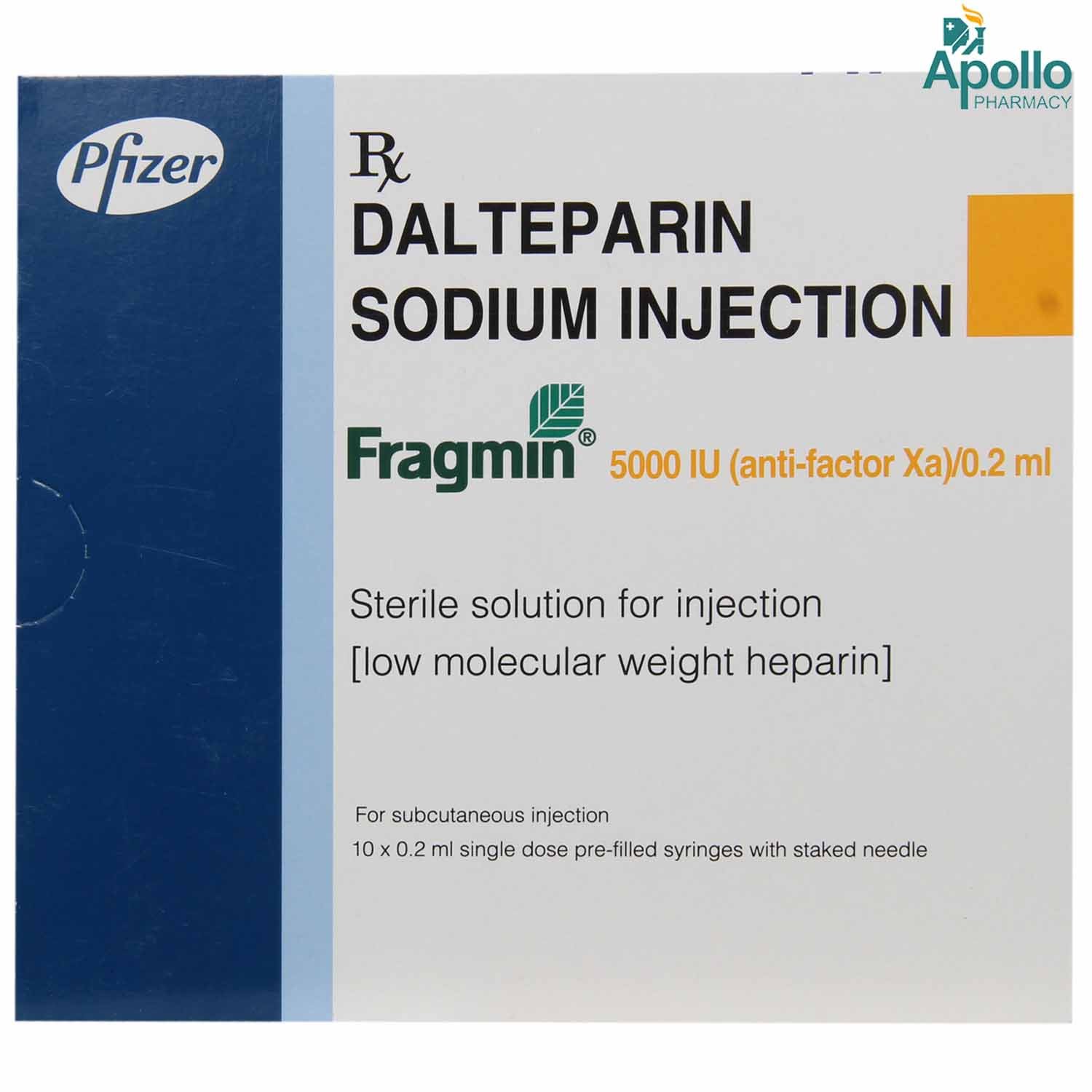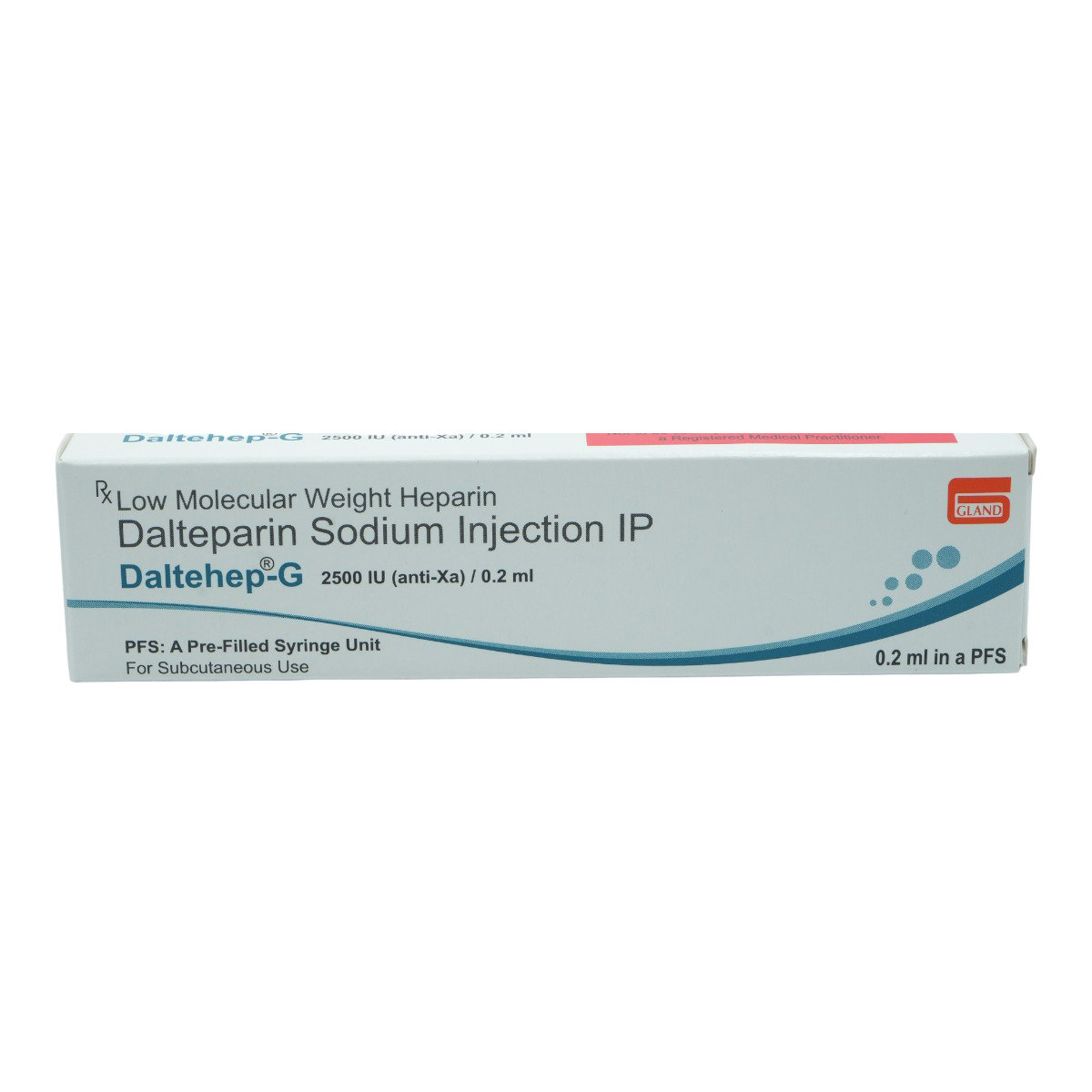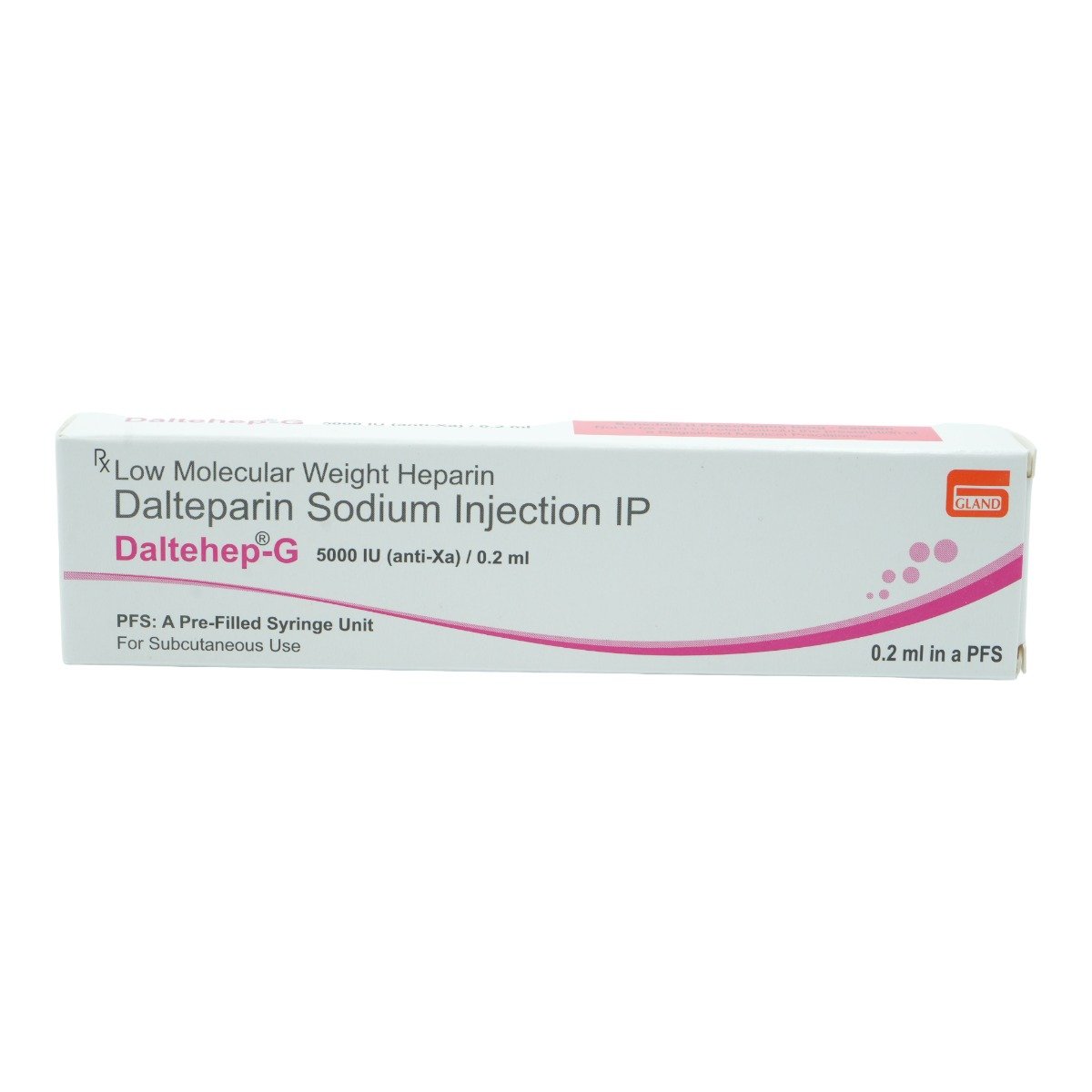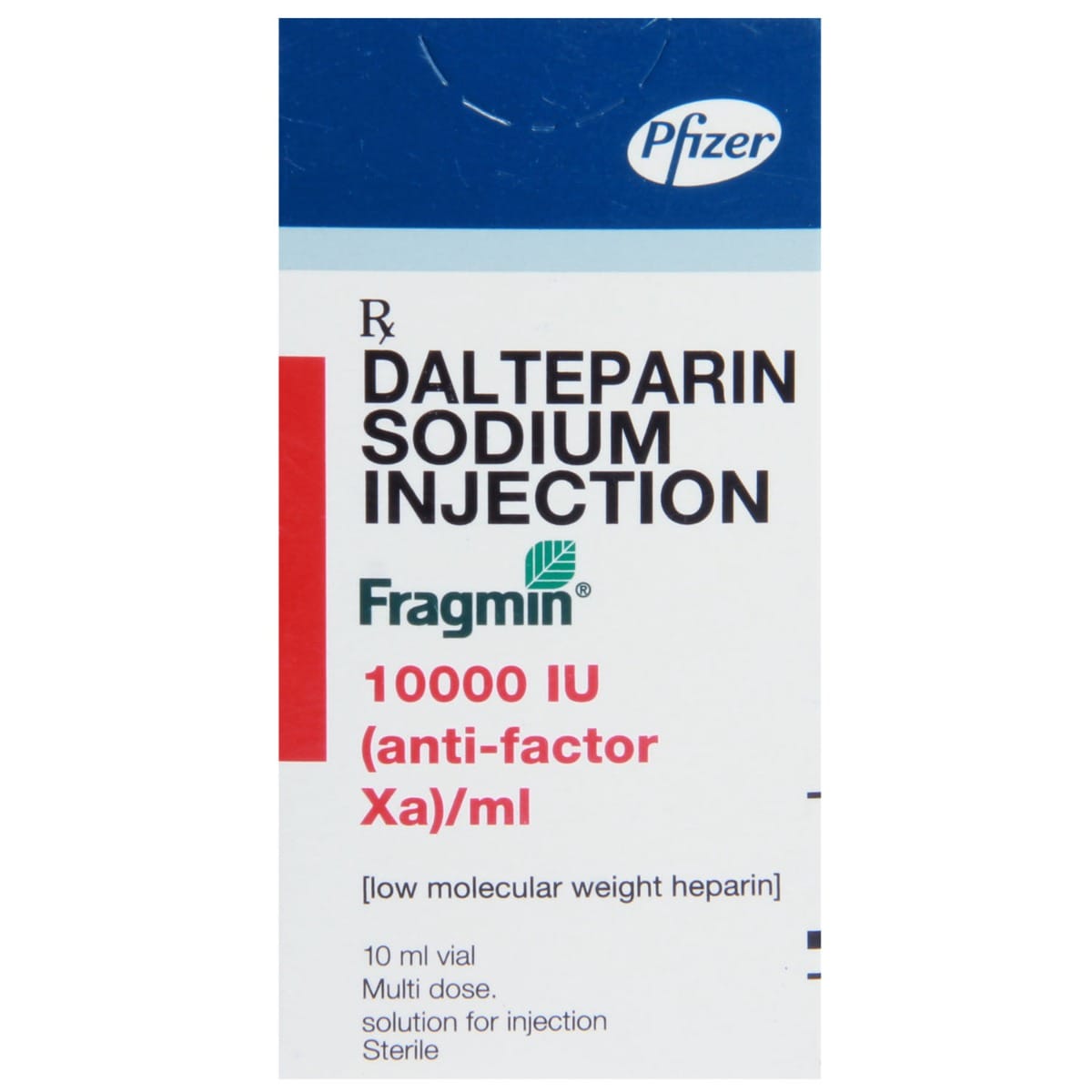Dalteparin
About Dalteparin
Dalteparin belongs to a class of drugs known as anticoagulants (blood thinner), primarily used to prevent and treat stroke risk, and heart attack in patients with atrial fibrillation (irregular heart rhythm), reducing blood clot formation. Besides this, it is also used to prevent deep vein thrombosis (blood clots in leg veins) and pulmonary embolism (blood clots in the lung) and reduces the risk of getting clots in people who have undergone knee or hip replacement surgeries. A blood clot can occur in any part of the body, leading to a heart attack, stroke and damage to organs (even coma or death). Blood clots can reach your arteries or veins in the organs like the brain, kidney, heart, lungs and limbs.
Dalteparin contains ‘Dalteparin’ works by inhibiting the production of clotting factors Xa and thrombin. This prevents fibrinogen's conversion (soluble protein) to fibrin (insoluble protein), thereby preventing blood clot formation. It makes blood flow easily through your veins, making it less likely to form a serious blood clot. So, an intake of Dalteparin helps prevent blood clots if you have an increased risk of having a heart attack or stroke.
Take Dalteparin as prescribed by your doctor. You are advised to take Dalteparin for as long as your doctor has prescribed it for you based on your medical condition. Some people may experience unusual bleeding, haematoma (blood clotting under the skin), thrombocytopenia (low number of platelets), pain and irritation at the injection site. Most of these side effects of Dalteparin do not require medical attention and gradually resolve over time. However, if the side effects persist or worsen, please consult your doctor.
If you are allergic to Dalteparin or any other medicines, please tell your doctor. If you are pregnant or breastfeeding, it is advised to consult a doctor before using Dalteparin. Dalteparin should be used with caution in the elderly above 65 years of age as they may be at high risk of bleeding. Dalteparin should be given to children only if prescribed by a doctor. Extra care must be taken while brushing your teeth or shaving to prevent bleeding. If you have a stomach ulcer, kidney or liver problems, high blood pressure or bleeding problems, inform your doctor before taking Dalteparin. Try not to stop taking this medicine of your own. Stopping a sudden intake of Dalteparin may worsen your condition and increase your risk of cardiovascular death, heart attack and stroke.
Uses of Dalteparin
Medicinal Benefits
Dalteparin belongs to a class of drugs known as anticoagulants or blood thinners. Dalteparin contains ‘Dalteparin’ used to prevent clot formation in deep vein thrombosis (veins of the legs), pulmonary embolism (lungs), stroke (brain) and heart in patients with atrial fibrillation (irregular heart rhythm). Dalteparin is primarily used to prevent and treat the risk of the acute coronary syndrome (sudden reduction or blockage of blood flow to the heart) and stroke by reducing blood clot formation. Besides this, it reduces the risk of clots in people who have undergone knee or hip replacement surgeries and abdominal surgery. Dalteparin works by stopping the action of clotting factor Xa and thrombin (a protein that causes clotting). This prevents fibrinogen's conversion (soluble protein) to fibrin (insoluble protein), thereby preventing blood clot formation.
Directions for Use
- Follow your doctor’s recommendations on the dosage and timing of this medication to achieve optimal results.
- Dalteparin will be administered by a healthcare professional.
- Do not self-administer.
Storage
Side Effects of Dalteparin
- Bleeding
- Thrombocytopenia (low number of platelets)
- Haematoma (blood clotting under the skin)
- Pain and irritation at the site of injection
- easy bruising or bleeding
Medicines Containing this Salt
View AllDrug Warnings
-
If you are known to be allergic to Dalteparin or any other medicines, please tell your doctor.
-
If you are pregnant or breastfeeding, it is advised to consult a doctor before using Dalteparin.
-
Dalteparin should be given to children only if prescribed by a doctor.
-
Do not use multiple-dose formulations of Dalteparin in neonates and infants as they contain benzyl alcohol that may harm a newborn.
-
Dalteparin should be used with caution in the elderly above 65 years of age as they may be at high risk of bleeding.
-
If you have diabetes, high blood pressure, congestive heart failure, blood cell disorder (low platelets or low red blood cells), bleeding in the stomach or intestines, had a stroke, kidney, liver or bleeding problems, stomach ulcer, inform your doctor before taking Dalteparin.
-
Do not stop taking Dalteparin of your own. Stopping a sudden intake of Dalteparin may worsen your condition and increase your risk of cardiovascular death, heart attack and stroke. Hence, you should consult a doctor before stopping the dose of Dalteparin.
-
You should inform the doctor that you are taking Dalteparin before any surgery is scheduled.
-
Dalteparin can cause a serious blood clot around your spinal cord if you undergo a spinal tap or receive spinal anaesthesia (epidural).
-
Avoid consumption of alcohol while taking Dalteparin as it may increase the risk of stomach bleeding.
-
Extra care must be taken while brushing your teeth or shaving to prevent bleeding.
Drug Interactions
Drug-Drug Interactions: Dalteparin may have interaction with other blood thinners (abciximab, apixaban, enoxaparin, warfarin, clopidogrel, prasugrel, rivaroxaban, dabigatran, anisindione), pain killers (ibuprofen, naproxen, diclofenac, bromfenac, celecoxib), and antihypertensive (lisinopril, losartan, aliskiren, spironolactone, eplerenone).
Drug-Food Interactions: Dalteparin may interact with cranberry juice, grapefruit juice, noni juice, pomegranate juice, and green tea. Also, Dalteparin may interact with St. John’s wort (herbal medicine for depression), garlic, ginkgo biloba, ginseng, echinacea, goldenseal and coenzyme Q10. Also, avoid alcohol intake as it may increase the risk of bleeding.
Drug-Disease Interactions: If you have haemophilia (blood doesn't clot normally), diabetes, high blood pressure, congestive heart failure, blood cell disorder (low platelets or low red blood cells), bleeding in the stomach or intestines, had a stroke, kidney, liver or bleeding problems, stomach ulcer, inform your doctor before taking Dalteparin.
Drug-Drug Interactions Checker List:
Safety Advice

Alcohol
unsafeAvoid alcohol consumption while on treatment with Dalteparin as it may increase the risk of bleeding.

Pregnancy
cautionDalteparin is a Category C pregnancy drug and is given to pregnant women only if clearly needed and has more benefits than risks. Preservative-free forms are preferred in pregnant women as preservatives such as benzyl alcohol may cross the placenta.

Breast Feeding
cautionDalteparin is not recommended for use in breastfeeding. If you are breastfeeding, inform your doctor before receiving Dalteparin.

Driving
cautionDalteparin usually does not affect your ability to drive or operate machinery.

Liver
cautionInform your doctor if you have any pre-existing or a history of liver disease. Your doctor will weigh the benefits and potential risks before prescribing Dalteparin. However, it is not recommended for patients with severe liver diseases.

Kidney
cautionInform your doctor if you have any pre-existing or a history of kidney diseases. Your doctor will weigh the benefits and potential risks before prescribing Dalteparin. However, it is not recommended in patients with severe kidney diseases.

Children
cautionDalteparin should be given to children only if prescribed by a doctor.
Habit Forming
Diet & Lifestyle Advise
- Do not make any changes in your diet without first talking to your doctor.
- Avoid vitamin K-rich foods such as coriander, cabbage, spinach, broccoli, collard greens, kale (leaf cabbage), black liquorice, turnip greens, avocados, and Brussels sprouts as they may decrease the effectiveness of Dalteparin.
- Avoid cranberry juice, grapefruit juice, noni juice, pomegranate juice and green tea as they may interact with Dalteparin and lead to unwanted side effects.
- Do the regular exercise as it helps to dissolve blood clots, especially in obese people.
- Avoid the consumption of alcohol as it may increase the risk of bleeding.
- Take the medication as directed by the doctor and at regular intervals. Do not use other over-the-counter medications, herbal or vitamin supplements without informing your pharmacist or doctor when you take Dalteparin.
- Keep your cholesterol and triglyceride levels under control.
- Eat at regular intervals and maintain a healthy diet that includes fresh fruits and vegetables.
- Limit alcohol intake since it raises blood pressure and increases the risk of heart disease.
- Keep a check on your weight and exercise regularly to keep your heart healthy.
- Your doctor also guides you on how to notice and manage the early symptoms of detecting heart diseases.
Special Advise
You should have a regular platelet count, factor V assay, fibrinogen level test, prothrombin time test (PT or PT-INR), and the INR, or international normalized ratio, to analyze your blood clotting time.
Patients Concern
Disease/Condition Glossary
Blood clot: A blood clot is a clump of blood that has changed from a liquid to a gel-like or semisolid state. Blood clots are formed to stop bleeding that occurs due to tissue injury. Though blood clots are useful to stop bleeding, they may be harmful when abnormally formed within blood vessels as they block blood vessels and inhibit blood flow to essential organs such as the brain, heart or lungs and result in serious conditions.
Deep vein thrombosis (blood clots in legs): Deep vein thrombosis is a medical condition in which blood clots form in deep veins, usually in the legs. The symptoms include leg pain or swelling.
Pulmonary embolism (blood clots in the lung): Pulmonary embolism is a condition that occurs as the blood clots break and travel to the lungs from deep veins in the legs or other parts of the body. The symptoms of pulmonary embolism include chest pain, cough and shortness of breath. Stroke is a condition where a blood clot restricts blood flow to your brain, causing brain cells to die and possibly resulting in permanent brain damage or death.
Heart attack: A heart attack is when a blood clot blocks a blood vessel supplying your heart, starving it of oxygen and causing chest pain and sometimes death. Quick medication is advised to reduce the risk of serious conditions due to blood clots.
FAQs
Dalteparin is used to prevent the risk of stroke, and heart attack in patients with atrial fibrillation (irregular heart rhythm) by reducing blood clot formation. Besides this, it is also used to prevent deep vein thrombosis (blood clots in leg veins) and pulmonary embolism (blood clots in the lung) and reduces the risk of getting clots in people who have undergone knee or hip replacement surgeries.
Dalteparin contains Dalteparin, an anticoagulant (blood thinner) that inhibits the production of clotting factors Xa (a protein that causes clotting). It prevents the conversion of fibrinogen to fibrin (a protein that binds platelets together and forms a clot) and helps prevent blood clot formation.
No, you are not recommended to take clopidogrel with Dalteparin as co-administration of these two medicines may increase the risk of bleeding more easily. However, if you notice blood in urine or stools, dizziness, unusual bleeding or bruising, vomiting, weakness or headache, please consult a doctor immediately. If you are supposed to use these medicines together, you are advised to contact your doctor so that the dose may be adjusted appropriately to use safely.
It is recommended to avoid taking grapefruit and grapefruit juice while taking Dalteparin. It contains compounds that slow down the metabolism of Dalteparin and increase the activity leading to bleeding.
Do not stop taking Dalteparin without consulting your doctor to worsen the condition. Therefore, take Dalteparin for as long as your doctor has prescribed it.
Yes, Dalteparin may increase potassium levels in the blood (hyperkalaemia), especially when given for a long period. Therefore, it is advised to inform your doctor if you are taking any medicines that increase potassium levels in the blood.
Yes, Dalteparin consists of Dalteparin is a blood-thinning agent and can increase the risk of bleeding. It is advised to be cautious during your daily activities like shaving, cutting fingernails or using sharp objects. Also, please consult your doctor beforehand if you undergo any surgery.





